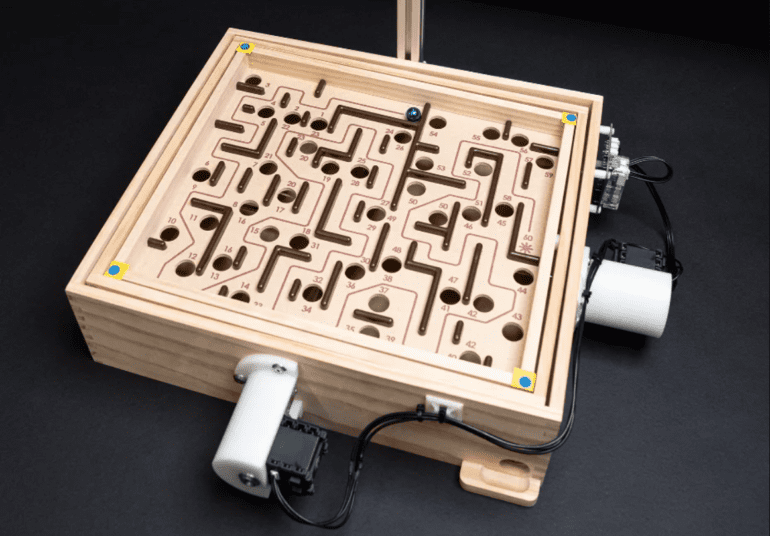TL;DR:
- Researchers at ETH Zurich unveil CyberRunner, an AI-driven robot that excels in the physical marble game Labyrinth.
- CyberRunner combines model-based reinforcement learning with dexterity to outperform human players.
- The game involves guiding a marble through a maze without falling into holes, controlled by rotating dials.
- CyberRunner learns from experience using a camera and algorithm, continually improving its gameplay.
- After six hours of practice, CyberRunner completed Labyrinth in just 14.5 seconds, faster than any human.
- Researchers had to correct the robot’s use of unintended shortcuts.
- This achievement highlights AI’s prowess in games requiring physical skill.
- CyberRunner’s open-source availability promises to advance AI capabilities further.
Main AI News:
In a remarkable breakthrough, researchers at ETH Zurich have introduced CyberRunner, an AI-powered robot that outpaces human players in the physically demanding marble game Labyrinth. The brainchild of Thomas Bi and Raffaello D’Andrea, this cutting-edge creation seamlessly melds model-based reinforcement with the finesse required to master a game that hinges on physical skill, coordination, and precision.
For those unacquainted with the challenge at hand, Labyrinth entails guiding a marble through a maze without succumbing to the treacherous pitfalls below. Players manipulate the ball’s trajectory by deftly rotating two dials that tilt the playing field.
What sets CyberRunner apart is its ability to learn through experience. Equipped with a keenly observant camera, the robot employs a sophisticated algorithm that gleans insights from each trial. “Based on its evolving comprehension of the game, it identifies which strategies and behaviors hold greater promise,” assert the researchers. Consequently, the robot continually refines its performance.
In a rigorous test, both CyberRunner and several human participants were allotted approximately six hours of practice with the game. While the human players encountered formidable challenges in their quest to conquer Labyrinth, CyberRunner achieved an astonishing victory in just under 14.5 seconds. This achievement represents a significant milestone, as it surpasses all previously recorded human performance times.
Such was the prowess of CyberRunner that it even uncovered unintended shortcuts within the game’s design. The researchers found themselves compelled to intervene, directing the AI to adhere to the intended path within the maze.
While AI models have previously eclipsed human capabilities in games like chess, Go, and Dota 2, the triumph of CyberRunner in a game demanding physical dexterity is a noteworthy stride forward.
In an admirable gesture of knowledge-sharing, the researchers have decided to open-source CyberRunner, allowing the wider scientific community to explore and harness the potential of this extraordinary creation.
Conclusion:
The success of CyberRunner in the Labyrinth game underscores the increasing dominance of AI in tasks that demand physical prowess. This breakthrough signifies a potential shift in the market, with AI-driven solutions poised to disrupt industries relying on intricate physical processes, from manufacturing to logistics, offering unprecedented efficiency and precision. Businesses that embrace and integrate AI technologies stand to gain a significant competitive edge in this evolving landscape.

